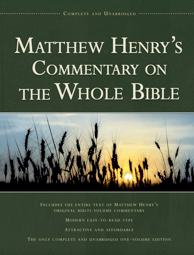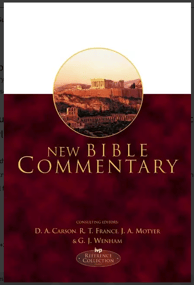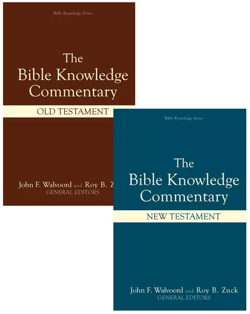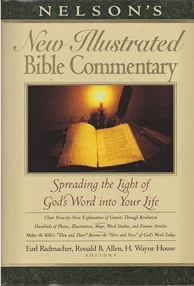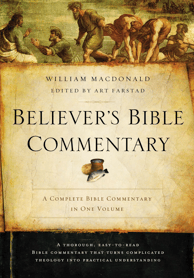
Bible Commentaries
As you read your bible daily during your bible study, you may begin to have questions about some of the texts that you read, especially some of the OT passages, which can have words or phrases that are not that easy to understand. To help with understanding the bible commentaries and dictionaries have been produced for a long time. Because even the experienced theologian might come across a passage they find a bit tricky, or a key word they just don’t understand. For the general member of a church congregation this can be even harder, as they might not have a theological library to dip into, which clergy often have.
This is where study bibles, or one volume bible commentary’s can be especially helpful. For some they will give a simple overview of the passage, and any key themes or key words, while others will give a simple overview of key verses in chapters. Though they may not be as in-depth as a one book bible commentary that focuses on one book exclusively, they can be very helpful in understanding what you are reading.
However you read your bible, it might be useful to have access to some extra information. Below are some of the better One volume commentaries that are available. They are not cheap, often over £30, but will serve you well as you dip in and out through the year. An alternative is of course is to use a study bible which has some information to help you understand the section. The only problem with these is that they can never give you a full picture of what the passage is talking about. Hence why more detailed commentaries are better.
Some popular one volume bible commentaries
The following are some of the more popular and recommended bible commentaries. I’ve given you an example of how they compare by showing what each commentary says about some of the first verses in Genesis. All of them give an overview of each book, before going onto explain what the passage means.
I've put links to various online bookshops but use the one you feel is best!


Sample Passage
Genesis 1:1-5
The Creation of the World
1 In the abeginning, God created the heavens and the earth. 2 The earth was bwithout form and void, and darkness was over the face of the deep. And the Spirit of God was hovering over the face of the waters.
3 And God said, “Let there be light,” and there was light. 4 And God saw that the light was good. And God separated the light from the darkness. 5 God called the light Day, and the darkness he called Night. And there was evening and there was morning, the first day.
The Holy Bible: English Standard Version (Wheaton, IL: Crossway Bibles, 2016), Ge 1:1–5.
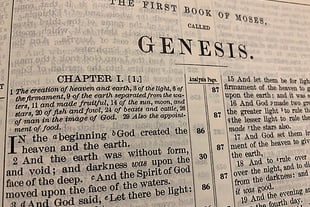

Matthew Henry's Commentary
Verses 1–2
In these verses we have the work of creation in its epitome and in its embryo.
I. In its epitome, v. 1, where we find, to our comfort, the first article of our creed, that God the Father Almighty is the Maker of heaven and earth, and as such we believe in him.
1. Observe, in this verse, four things:—
(1.) The effect produced—the heaven and the earth, that is, the world, including the whole frame and furniture of the universe, the world and all things therein, Acts 17:24.
He goes on for a lot more than this!
Matthew Henry, Matthew Henry’s Commentary on the Whole Bible: Complete and Unabridged in One Volume (Peabody: Hendrickson, 1994), 3.
New Bible Commentary: 21st Century Edition
1:1–2 The beginning of creation
The NIV accepts the traditional understanding of these verses, namely that they describe the very first act of creation, when God created all matter (the heavens and the earth) out of nothing. But the earth immediately after creation was formless and empty, i.e. unproductive and uninhabited. So the narrative then proceeds to relate how in six days God organized this chaos into the well-ordered world we now see.
Some modern translations and commentators understand v 1 differently. Some (e.g. the NEB) take it simply to be defining the situation when God started to create, ‘In the beginning when God created … the earth was formless …’ Others simply regard v 1 as a summary title to the first chapter. But neither view is as likely as that adopted by the NIV. ‘Create’ is something that only God does (the verb is used only of God in the OT). He demonstrates his power by creating marvellous and unexpected things (Nu. 16:30), e.g. great sea creatures (21), men and women (27) and mountains (Am. 4:13).
V 2 pictures the world as dark and desolate, covered by water and with the mysterious Spirit (or ‘wind’) of God hovering above the ocean. The suggestion here of a power within the Godhead is developed further by Pr. 8:22–31 and Jn. 1:1–3, which speak of ‘wisdom’ and ‘the Word’ assisting in creation.
As with Matthew Henry, this goes on for quite a bit of detail.
Gordon J. Wenham, “Genesis,” in New Bible Commentary: 21st Century Edition, ed. D. A. Carson et al., 4th ed. (Leicester, England; Downers Grove, IL: Inter-Varsity Press, 1994), 60.
The Bible Knowledge Commentary: An Exposition of the Scriptures
1:1–2. These verses have traditionally been understood as referring to the actual beginning of matter, a Creation out of nothing and therefore part of day one. But the vocabulary and grammar of this section require a closer look. The motifs and the structure of the Creation account are introduced in the first two verses. That the universe is God’s creative work is perfectly expressed by the statement God created the heavens and the earth. The word bārā’ (“created”) may express creation out of nothing, but it certainly cannot be limited to that (cf. 2:7). Rather, it stresses that what was formed was new and perfect. The word is used throughout the Bible only with God as its subject.
But 1:2 describes a chaos: there was waste and void, and darkness was over the surface of the deep. The clauses in verse 2 are apparently circumstantial to verse 3, telling the world’s condition when God began to renovate it. It was a chaos of wasteness, emptiness, and darkness. Such conditions would not result from God’s creative work (bārā’); rather, in the Bible they are symptomatic of sin and are coordinate with judgment. Moreover, God’s Creation by decree begins in verse 3, and the elements found in verse 2 are corrected in Creation, beginning with light to dispel the darkness. The expression formless and empty (ṯōhû wāḇōhû) seems also to provide an outline for chapter 1, which describes God’s bringing shape and then fullness to the formless and empty earth.
Some have seen a middle stage of Creation here, that is, an unfinished work of Creation (v. 2) that was later developed (vv. 3–25) into the present form. But this cannot be sustained by the syntax or the vocabulary.
Others have seen a “gap” between the first two verses, allowing for the fall of Satan and entrance of sin into the world that caused the chaos. It is more likely that verse 1 refers to a relative beginning rather than the absolute beginning (Merrill F. Unger, Unger’s Commentary on the Old Testament. 2 vols. Chicago: Moody Press, 1981, 1:5). The chapter would then be accounting for the Creation of the universe as man knows it, not the beginning of everything, and verses 1–2 would provide the introduction to it. The fall of Satan and entrance of sin into God’s original Creation would precede this.
It was by the Spirit that the Lord God sovereignly created everything that exists (v. 2b). In the darkness of the chaos the Spirit of God moved to prepare for the effectual creative word of God.
Allen P. Ross, “Genesis,” in The Bible Knowledge Commentary: An Exposition of the Scriptures, ed. J. F. Walvoord and R. B. Zuck, vol. 1 (Wheaton, IL: Victor Books, 1985), 28.
Nelson’s New Illustrated Bible Commentary
1:1 In the beginning is a thesis statement, which can be paraphrased, “Here is the story of God’s creation of the heavens and the earth.” John 1:1 speaks of a time that predates Gen. 1:1, but no information is given here on what happened before this time. It is possible that the rise, rebellion, and judgment of Satan transpired before these events. In ch. 3 Satan has already fallen (he tempts Eve in the guise of the serpent), and Gen. 6:1–4 speaks of angels who are already fallen. Furthermore, God’s angels already have been created (3:24). In ch. 1 the focus is on the creation of the material world—the heavens and the earth. God: This standard Hebrew term for deity, Elohim, is in the form called the plural of majesty or the plural of intensity. In contrast to the ordinary plural (gods), this plural means “the fullness of deity” or “God—very God.” Even though the word for God is plural, the verb for created is singular. It means “to fashion anew.” This often used word in the Bible always has God as its subject. Here, it means that God renewed what was in a chaotic state. God changed chaos into cosmos, disorder into order, emptiness into fullness. The heavens and the earth mean “all of creation” or “the cosmos.
1:2 The two words without form and void express one concept—chaos. The earth had been reduced to this state (Jer. 4:23); it was not the way God had first created it (Is. 45:18). Darkness is a potent biblical symbol of evil and wrong (Job 3:5; Ps. 143:3; Is. 8:22; John 3:19). The deep is a term for the secret places of the waters (7:11). This term sounds enough like the name of the Babylonian goddess Tiamat to remind the ancient reader of the Babylonian story of creation, to which the biblical story stands in dramatic contrast. All these images together portray chaos, disaster, and devastation. From this portrait of utter ruin, God brought an orderly creation. The Spirit of God was hovering like a mother stork might hover over her nest—a portent of life to come from the dark, murky depths of the chaos below (the Spirit is described as a dove in Matt. 3:16).
Earl D. Radmacher, Ronald Barclay Allen, and H. Wayne House, Nelson’s New Illustrated Bible Commentary (Nashville: T. Nelson Publishers, 1999), 4.
Believer’s Bible Commentary: Old and New Testaments
A. The Creation (Chaps. 1, 2)
1:1 “In the beginning God.…” These first four words of the Bible form the foundation for faith. Believe these words, and you can believe all that follows in the Bible. Genesis provides the only authoritative account of creation, meaningful for people of all ages but exhaustible by no one. The divine record assumes the existence of God rather than seeking to prove it. The Bible has a special name for those who choose to deny the fact of God. That name is fool (Ps. 14:1 and 53:1). Just as the Bible begins with God, so He should be first in our lives.
1:2 One of several conservative interpretations of the Genesis account of creation, the creation-reconstruction view, says that between verses 1 and 2 a great catastrophe occurred, perhaps the fall of Satan (see Ezek. 28:11–19).3 This caused God’s original, perfect creation to become without form and void (tōhû wāvōhû). Since God didn’t create the earth waste and empty (see Isa. 45:18), only a mighty cataclysm could explain the chaotic condition of verse 2. Proponents of this view point out that the word translated was (hāyethā) could also be translated “had become.”4 Thus the earth “had become waste and empty.”
The Spirit of God was hovering over the face of the waters, preparatory to the great creative and reconstructive acts to follow. The remaining verses describe the six days of creation and reconstruction which prepared the earth for human habitation.
William MacDonald, Believer’s Bible Commentary: Old and New Testaments, ed. Arthur Farstad (Nashville: Thomas Nelson, 1995), 32.
All of these books can be found in most book shops. For more information about them and other multi series commentaries then visit https://bestcommentaries.com/whole-bible-commentaries/ which is the best website for information on bible commentaries.

